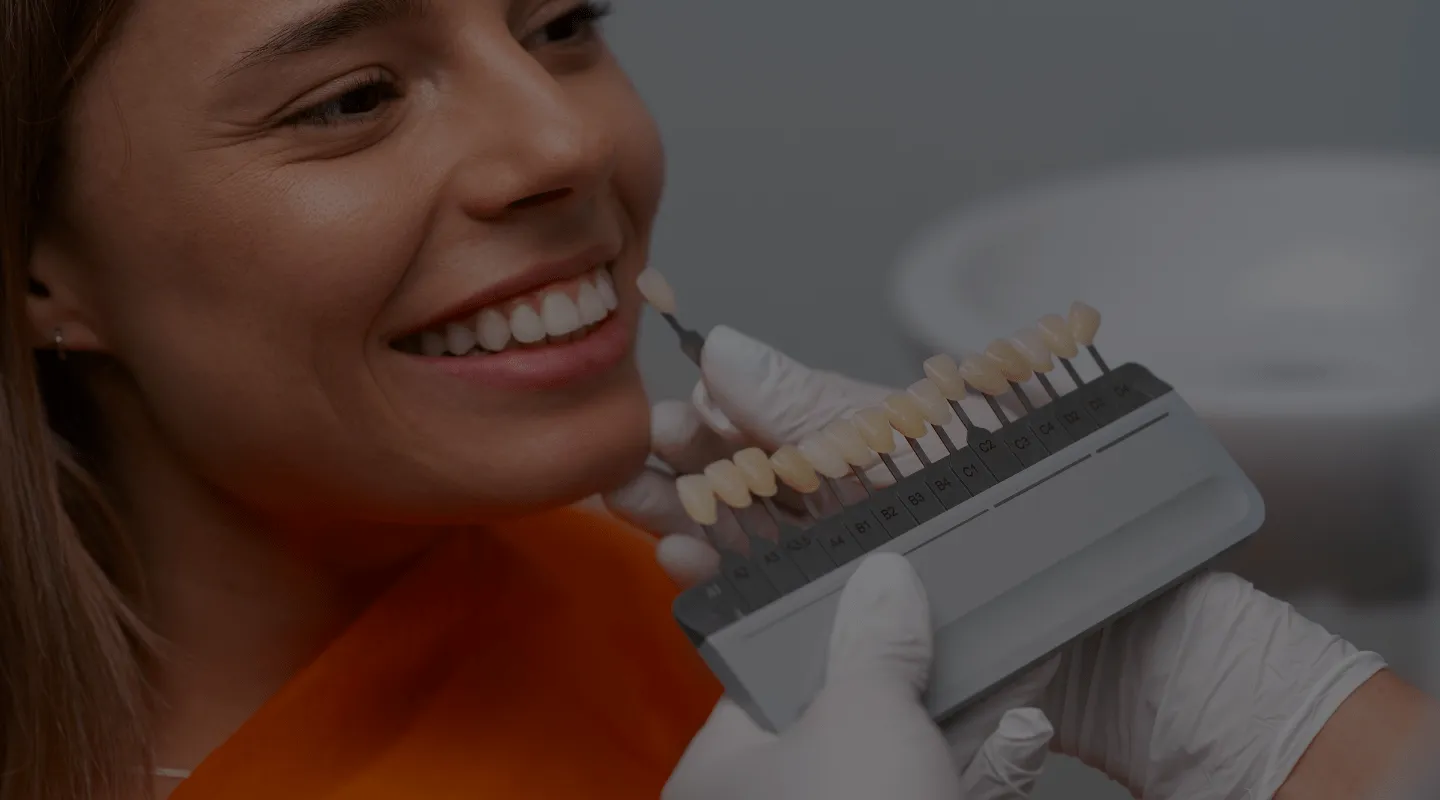
Dental Veneers
Your Affordable Dental Veneers in Tunisia
Get a Hollywood smile with ultra-thin and natural-looking dental veneers.
How does it work?
What are dental veneers?
Veneers are custom-made, thin shells of tooth-colored material that are bonded to the existing teeth. They are more of a cosmetic than a restorative treatment for tooth alignment. Dental veneers mimic the appearance of natural teeth while improving their color, shape, size, and length.
Why get dental veneers?
Dental veneers are increasingly sought after to improve the aesthetics of teeth and provide patients with a beautiful smile. Often, patients have crooked, discolored, short, long, chipped, broken, or gapped teeth. Dental veneers can repair and hide all these flaws.
How much do dental veneers cost?
The price of dental veneers depends on several factors, including the type of veneer (porcelain, composite, or zirconia) and the number of teeth requiring veneers.
What are the different steps for placing dental veneers?
Placing dental veneers is a relatively simple procedure that doesn’t require any special preparation for the patient. No surgical intervention is needed. Once you’ve had your first consultation, the dentist will present you with different options to achieve the results you desire. They will also take photos and dental impressions to assess your situation. During the second visit to the office, the dentist will begin preparing the teeth by removing up to half a millimeter of enamel from the teeth to which the veneers will be bonded. The teeth will be cleaned and polished. The dentist will roughen the tooth surface by making small grooves, which will help strengthen the adhesion of the veneers to the teeth. Local anesthesia can be applied to reduce pain. The dentist will finish by taking impressions of the teeth for the ordering of the veneers.
Once the dental veneers are made, the dentist will apply a special cement to the veneer before placing it on your tooth. Once in the correct position, your veneers will be photo-polymerized. A light beam is used to activate the chemicals in the cement, causing the cement to harden quickly and finalize the bonding of the veneer to your tooth. The final step is to check that the veneers are well positioned and that the occlusion is correct. Necessary adjustments will be made to correct any defects.
What are the different types of dental veneers?
There are two main types of dental veneers: composite resin or porcelain. The best material to use for your dental veneers depends on your budget and your choice.
Composite resin dental veneers
Composite resin veneers are usually placed on the tooth in a single appointment. Once the tooth has been prepared to receive the veneer, the dentist mixes and shapes the composite material and applies it to the tooth. A special light is then used to harden the material and the dental veneer is smoothed to resemble a natural tooth. Although it is a more affordable option than porcelain veneers, they last 4 to 8 years and require more maintenance as they are more prone to chipping.
Porcelain veneers
Ceramic dental veneers are more durable than resin veneers. They can last 15 to 20 years and require little maintenance. The dentist will take an impression of your prepared teeth and send them to a laboratory where they can reproduce the shape of your veneers. Once made a few days to weeks later, the dentist will ensure that the veneers have the shape, size and color that match your teeth. Dental cement is then used to bond the veneers to the teeth. If you want to have porcelain dental veneers, you should have good periodontal and oral health, have oral care, and have proper teeth hygiene with regular brushing and flossing. Finally, you need to have a sufficient thickness of enamel on the teeth to allow for the execution of the dental veneer treatment.
When are dental veneers recommended?
Dental veneers are invaluable allies when the aesthetics of our teeth are compromised. Whether it’s for unsightly stains, breakage, or irregular shape, they allow you to restore your smile with confidence. Front teeth in particular benefit greatly from their effectiveness, as they are often the most exposed when we laugh. The procedure for placing dental veneers involves preparing the tooth before placing the porcelain or composite veneer. Dental veneers offer a durable and natural solution to restore the appearance of teeth, giving them a uniform and harmonious appearance.
Am I a good candidate for dental veneers?
Veneers are perfect for patients whose teeth are naturally yellow or have a gray tint and cannot get white teeth with in-chair whitening. Dental veneers are also a solution for patients with cracked teeth. They are also used to repair the shape of a tooth or protect it from other problems. Veneers improve the appearance of teeth while protecting and strengthening them.
Are there alternatives to dental veneers?
The preparation of the tooth enamel for bonding a dental veneer is irreversible. For this reason, some patients wish to have less permanent alternative treatments, such as teeth whitening. If you have discoloration and want to fix it, you can consider teeth whitening. In-office whitening applied by a dentist can give you quick and satisfactory results for a radiant smile. Similar to dental veneers, dental bonding helps improve the appearance of chipped or undesirably shaped teeth. Although some etching and shaping of your tooth is necessary, dental bonding is a reversible treatment.
How are dental veneers placed?
The placement of dental veneers is a precise and meticulous process that requires the intervention of a dental professional. Several steps are involved in the placement of dental veneers, depending on the type of veneer used. Two of the most commonly used types of veneers are Lumineers and ceramic veneers. First, the dentist assesses the condition of the patient’s teeth and discusses their aesthetic expectations. Then, a dental impression is taken to custom-make the veneers. If necessary, it is possible to remove a tiny layer of enamel from the tooth to perfect the fit of the veneer. Then, the veneers are meticulously adjusted and fixed to the teeth using high-quality dental adhesive. The tooth under the veneer is protected and strengthened, providing a natural and durable appearance. When it comes to placing dental veneers. It is imperative to emphasize that this is a complex procedure that should only be performed by a qualified dentist. It is strongly discouraged to attempt to place dental veneers yourself, as this can lead to problems both in terms of dental health and aesthetics.
How long does it take to get dental veneers?
It usually takes two visits to apply the veneers. The duration of the visits will depend on the number of veneers the patient chooses to place. There is often a waiting period of 2 to 4 days for the manufacture of the dental veneers. A stay of 5 working days in Tunisia is required for 8 to 12 dental veneers.
What are the advantages of dental veneers?
Dental veneers are increasingly popular due to their low maintenance and the need for relatively few modifications to existing teeth. They generally require less enamel removal from the teeth than dental crowns. Good oral hygiene is the only maintenance required once they are bonded to the teeth. With dental veneers, the patient will have better self-esteem, better self-confidence, and a lasting solution.
What are the side effects of dental veneers?
Dental veneers, while effective in improving the appearance of teeth, can sometimes lead to some side effects. Among the possible side effects, pain can occur immediately after the placement of veneers due to the initial adjustment of the teeth. Another side effect is implant mobility, where veneers can become slightly mobile if not properly fixed. Veneer cracking or fracture is also a concern, especially if excessive pressure is placed on the treated teeth. Finally, bacterial peri-implantitis, a bacterial infection around the implant, can develop if proper oral care is not maintained, leading to inflammation and possible implant failure.
How long do dental veneers last?
With proper care, porcelain veneers will last 10 to 15 years, while composite veneers will last 4 to 8 years on average. Regardless of the material, dental veneers will need to be replaced after a certain period.
What is the difference between dental veneers and dental crowns?
Dental veneers and dental crowns are two commonly used options in dentistry to restore not only the beauty, but also the function of teeth. Although they have a common objective, the major difference between the two is the surface area they cover. Veneers, which rest on the anterior surface of the tooth, consist of a thin ceramic or resin shell to improve aesthetic appearance. Their use frequently aims to correct defects such as stains, cracks, or irregular shape. When considering placing a dental veneer, it should be known that a small amount of enamel preparation is usually necessary. On the other hand, if the tooth is very damaged, the solution may be a dental crown that completely covers the damaged or restored tooth. Crowns, often made of ceramic, are recommended for a severely altered, devitalized tooth or one requiring more extensive restoration. There are several types of dental crowns that can be used, including ceramic, porcelain-fused-to-metal, and composite resin. Applying a dental crown requires a more significant reduction of the tooth in order to make it fit properly. Depending on the patient’s personal needs in terms of dental health and aesthetics, the dentist may recommend veneers or crowns. It is essential to consult a qualified dentist to determine the best dental restoration solution for each particular case.
What are the expected results of a dental veneer?
Dental veneers are a popular aesthetic solution for improving the appearance of teeth. Give your imperfect teeth a natural transformation thanks to our experts. Thanks to dental veneer placement techniques, you can say goodbye to stained, cracked, or slightly misaligned teeth and welcome a radiant and harmonious smile. Our high-end materials, such as porcelain and ceramic, not only embellish your smile, but also strengthen the structure of your teeth, thus preserving them from any future damage.
Our advantages


Length of stay in Tunisia for your dental veneers?
A stay of 3 to 5 working days is required to place your dental veneers depending on the number of veneers. The patient can take advantage of this stay to have teeth whitening or to combine dental treatment with cosmetic surgery.
Your dental veneers in Tunisia with TDS
Would you like to request a quote for the organization of your dental veneers in Tunisia? The entire TDS team is at your disposal to assist you. Feel free to use our online form for any request concerning your dental veneers. We are delighted to provide you with the necessary information to organize your stay in Tunisia.
Your health, our priority.
Request your free quote.
Frequently Asked Questions
Yes, dental veneers can be used to correct gapped teeth, but it depends on the width of the gap. For very wide gaps, a combination with other orthodontic treatments may be necessary.
Dental veneers are designed to be permanent. If they need to be removed, it will require resurfacing the underlying teeth and placing new veneers or other dental restorations.
Dental veneers are made to match or improve the natural shade of the teeth. They do not discolor like natural teeth, but the surrounding teeth may change color over time, creating a contrast.
Dental veneers require similar care to natural teeth, including regular brushing, flossing, and regular visits to the dentist. It is also advisable to avoid biting into hard objects.
Dental veneers are very strong and durable, but they can detach or break in the event of significant trauma or misuse, such as biting on very hard objects. Regular visits to the dentist can help monitor their condition.
The lifespan of dental veneers is generally 10 to 15 years, but this can vary depending on the care provided and the patient’s lifestyle.
Some people may experience temporary tooth sensitivity after the placement of veneers, especially to hot and cold. This sensitivity usually disappears after a few days or weeks.
It is essential to treat cavities and ensure good oral health before placing dental veneers. The underlying teeth must be healthy to ensure the durability of the veneers.
Yes, dental veneers can be used to restore teeth worn down by bruxism, but it is important to treat the bruxism itself (often with a night guard) to avoid damaging the new veneers.
The manufacturing process of dental veneers generally involves an initial consultation, tooth preparation (which may include the removal of a thin layer of enamel), taking impressions, manufacturing the veneers in a laboratory, and finally their placement and adjustment.
